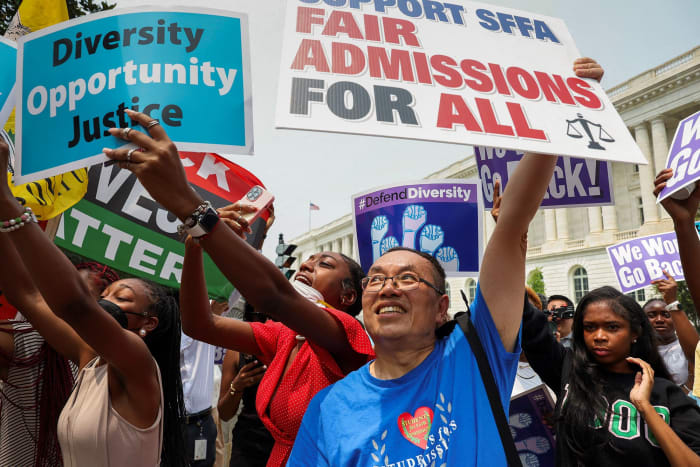
-
The Supreme Court ruled against affirmative action policies at Harvard University and the University of North Carolina. The decision, which carries nationwide implications, found the schools' race-based admissions policies violated Title VI of the Civil Rights Act and the 14th Amendment's Equal Protection Clause.
-
The court held that "eliminating racial discrimination means eliminating all of it," as written by Chief Justice John Roberts, leaving room for universities to consider how race has affected an applicant's life, but not to establish race-based admissions.
-
This ruling may drastically change the admissions processes at universities across the nation, requiring them to find non-race-related ways to ensure diversity. However, the decision has garnered criticism from Justices Jackson and Sotomayor, who argue it undermines progress in addressing racial inequality in education.
What Led to This Decision?
A group named Students for Fair Admissions had sued both universities, claiming they unfairly considered race in their admissions processes. The group argued that high-achieving Asian-American and white applicants were unfairly rejected due to these policies. The lawsuits accused Harvard of violating Title VI of the Civil Rights Act, which prohibits racial discrimination in schools that receive federal funding, and the University of North Carolina of violating the 14th Amendment’s Equal Protection Clause by factoring race into their admissions processes.
What Does This Mean for Affirmative Action?
The decision effectively overturns the 2003 Grutter v. Bollinger ruling that allowed universities to consider race in their admissions processes to maintain diverse campuses. It ends the systematic consideration of race in the admissions process. However, the majority opinion stated that the ruling does not prohibit universities from considering how an applicant's race has affected their life experience.
How Does This Impact Universities?
This ruling could lead to significant changes in admissions processes at universities nationwide. Those that consider race in their admissions and scholarship decisions will now have to find non-race-related ways to maintain diversity. Some institutions are considering shifting away from using standardized test scores, requiring more essays to gain insight into a student's background, or targeting recruitment efforts in minority areas.
What's the Response?
The response has been divided along ideological lines. Conservative commentators and activists have hailed the decision as a win for a "colorblind" Constitution, while liberal commentators and activists argue that affirmative action is a critical tool for addressing historic racial discrimination. The decision may lead to further legal challenges from affirmative action supporters. Meanwhile, a recent Reuters poll showed that a majority of Americans, 62%, oppose race-based college admissions.